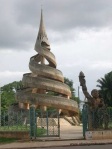
Yaoundé, the capital of Cameroon and its second largest city after Douala, is often known as “the city with the seven hills” because of the hills surrounding it… but what does it really mean? Does its name refer to its hills?

In Béti, Yaoundé is often called, Ongolo-Ewondo, or the Ewondos’ enclosure (la clôture des Ewondos). The city was born around 1889, when the German traders implanted a camp in the Ewondo region and called it Sono station after a local Ewondo chief Essono Ela who had offered them hospitality (the Germans had encountered a strong resistance in the Vouté and Eton regions). Hearing locals from the coast refer to it as Ya-Ewondo or Among the Ewondo (chez les Ewondos), the Germans called it ‘Jaunde’ and it later turned into ‘Yaunde’, and in French Yaoundé. The station later turned into an administrative region under the leadership of the botanist Zenker who established a detailed map of the area in 1890. Upon its creation, it was first a scientific post (probably because of the botanist), and later in 1895 became a military and trading post for ivory and rubber.

Yaoundé was not always the country’s capital. After the 1909 volcanic eruption of Mt Cameroon in Buéa (Gbéa) which was then the capital, and the humid climate of Douala, the Germans decided to move the capital to Yaoundé because of its central location and its milder climate (and of course, no volcano). After Germany’s defeat in World War I, Cameroon was placed under French (the eastern regions) and British protectorate (the western regions). Yaoundé consequently became the capital of French Cameroon, and continued as the capital of the Republic of Cameroon after independence (it was first the Federal Republic of Cameroon in 1961, then The United Republic of Cameroon in 1972, which then officially became the Republic of Cameroon in 1984). From 100 inhabitants on 2 acres on land at the end of the 19th century, Yaoundé is today a vibrant city home to almost 2 million inhabitants.

Yaoundé lies at the center of the nation, at about 600 – 1000 m above sea level. The city first grew around the Mfoundi river. A network of hills make up its landscape such as Mts Mbam Minkom (1295 m), Nkolodom (1221 m), Messa, Fébé, Akokdoué in the North and West, and Mt Eloumden (1159 m) in the south. The rivers are the Mfoundi, Ekozoa, Biyeme, and Mefou. Today, Yaoundé is the siege of power, the presidential palace, the house of parliament, all ministries and embassies. Please enjoy this song of one of Cameroon’s great singers: André-Marie Tala about Yaoundé, and its beauty. What I have always liked about Yaoundé are its hills (and the red soil): from the top of one them, other parts of the city can be seen; it gives a feeling of “breathing in” or “taking in” the beauty of the entire city. Feel the joy of visiting this city which, like Rome has 7 hills. Enjoy the Rome of Africa!


That was very brilliant my dear. Keep it up!
How I hope those pretend to be governing in Yaounde were seein this wonderful work
Aaron
LikeLike
Thank you Tonton Aaron… I am so glad you could visit the blog, and that you liked this article. Happy New Year.
LikeLike
I am always on your blog. This one, you did it like no professional journalist will do it. Look at the picture and the video of A.M. Talla. It was just marverlous. If Cameroon were America, you would have been invited at Etoudi (White House) for launch
Helas.
However, I am very proud of you
Aaron
LikeLike
A thousand thanks Tonton Aaron. I hope to always keep you proud.
LikeLike
We’re a group of volunteers and starting a new scheme in our community.
Your website offered us with valuable information to work on. You’ve done an impressive job and our whole community will be grateful to you.
LikeLike
Pingback: Africa’s Love Anthem: ‘AMI O’ by Ebanda Manfred | African Heritage
Pingback: Why the name: Kampala? | African Heritage
Pingback: Yaoundé Magic: Why we still must have hope for Cameroon
Great write-up on Yaounde. Cameroon has been one of the big countries I’ve been researching about as you might have seen in previous comments involving that country and the Congo. That was also a nice song. Have you heard of other Cameroonian musicians like Mr. Leo, Salatiel, or the Orchestre Baka Gbine?
LikeLike
yes… they are very good musicians. Cameroon does have a very extensive and rich musical culture
LikeLiked by 1 person
Sure thing. I’ve been liking a lot of the music from Cameroon so far.
LikeLike